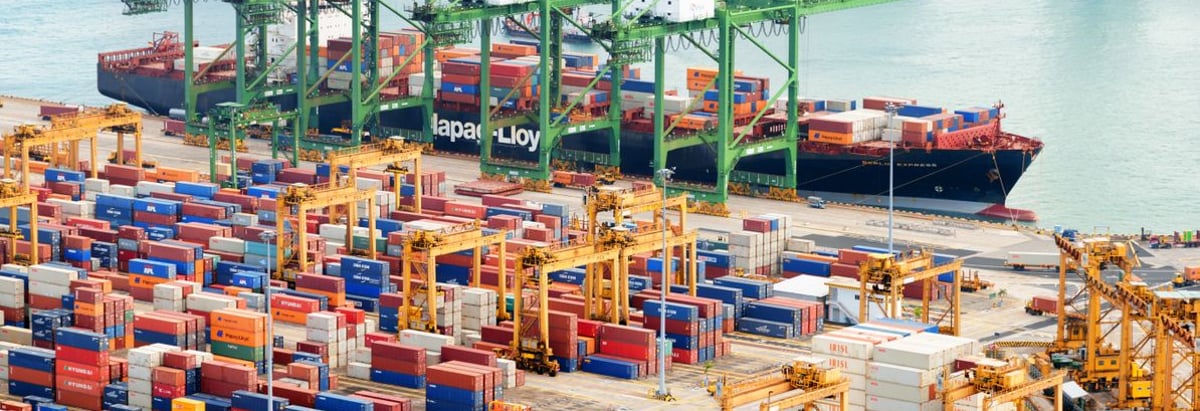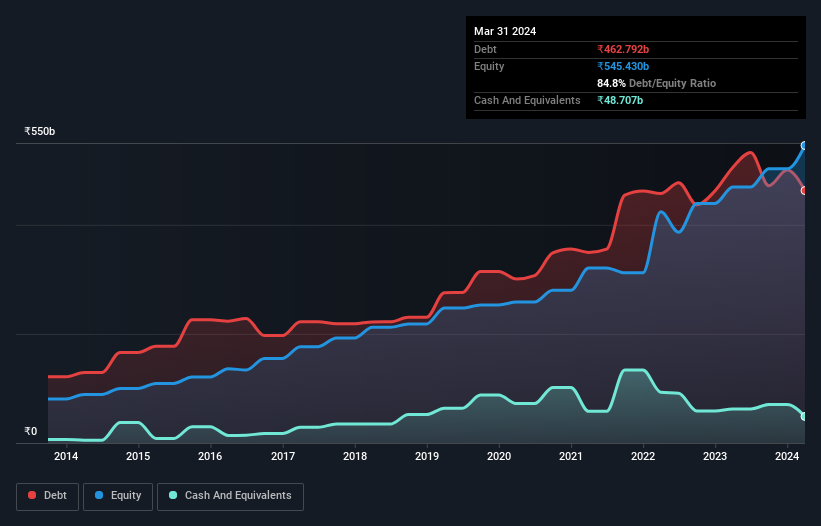- India
- /
- Infrastructure
- /
- NSEI:ADANIPORTS
Here's Why Adani Ports and Special Economic Zone (NSE:ADANIPORTS) Can Manage Its Debt Responsibly

Legendary fund manager Li Lu (who Charlie Munger backed) once said, 'The biggest investment risk is not the volatility of prices, but whether you will suffer a permanent loss of capital.' So it might be obvious that you need to consider debt, when you think about how risky any given stock is, because too much debt can sink a company. As with many other companies Adani Ports and Special Economic Zone Limited (NSE:ADANIPORTS) makes use of debt. But the more important question is: how much risk is that debt creating?
When Is Debt Dangerous?
Debt and other liabilities become risky for a business when it cannot easily fulfill those obligations, either with free cash flow or by raising capital at an attractive price. In the worst case scenario, a company can go bankrupt if it cannot pay its creditors. However, a more common (but still painful) scenario is that it has to raise new equity capital at a low price, thus permanently diluting shareholders. By replacing dilution, though, debt can be an extremely good tool for businesses that need capital to invest in growth at high rates of return. The first thing to do when considering how much debt a business uses is to look at its cash and debt together.
See our latest analysis for Adani Ports and Special Economic Zone
What Is Adani Ports and Special Economic Zone's Net Debt?
You can click the graphic below for the historical numbers, but it shows that Adani Ports and Special Economic Zone had ₹462.8b of debt in March 2024, down from ₹505.2b, one year before. On the flip side, it has ₹48.7b in cash leading to net debt of about ₹414.1b.

A Look At Adani Ports and Special Economic Zone's Liabilities
We can see from the most recent balance sheet that Adani Ports and Special Economic Zone had liabilities of ₹164.6b falling due within a year, and liabilities of ₹479.1b due beyond that. Offsetting this, it had ₹48.7b in cash and ₹45.8b in receivables that were due within 12 months. So its liabilities total ₹549.2b more than the combination of its cash and short-term receivables.
Of course, Adani Ports and Special Economic Zone has a titanic market capitalization of ₹3.19t, so these liabilities are probably manageable. Having said that, it's clear that we should continue to monitor its balance sheet, lest it change for the worse.
We use two main ratios to inform us about debt levels relative to earnings. The first is net debt divided by earnings before interest, tax, depreciation, and amortization (EBITDA), while the second is how many times its earnings before interest and tax (EBIT) covers its interest expense (or its interest cover, for short). The advantage of this approach is that we take into account both the absolute quantum of debt (with net debt to EBITDA) and the actual interest expenses associated with that debt (with its interest cover ratio).
Adani Ports and Special Economic Zone has net debt to EBITDA of 2.6 suggesting it uses a fair bit of leverage to boost returns. But the high interest coverage of 7.0 suggests it can easily service that debt. We note that Adani Ports and Special Economic Zone grew its EBIT by 27% in the last year, and that should make it easier to pay down debt, going forward. The balance sheet is clearly the area to focus on when you are analysing debt. But ultimately the future profitability of the business will decide if Adani Ports and Special Economic Zone can strengthen its balance sheet over time. So if you're focused on the future you can check out this free report showing analyst profit forecasts.
Finally, a company can only pay off debt with cold hard cash, not accounting profits. So we always check how much of that EBIT is translated into free cash flow. During the last three years, Adani Ports and Special Economic Zone produced sturdy free cash flow equating to 59% of its EBIT, about what we'd expect. This cold hard cash means it can reduce its debt when it wants to.
Our View
Happily, Adani Ports and Special Economic Zone's impressive EBIT growth rate implies it has the upper hand on its debt. But, on a more sombre note, we are a little concerned by its net debt to EBITDA. It's also worth noting that Adani Ports and Special Economic Zone is in the Infrastructure industry, which is often considered to be quite defensive. When we consider the range of factors above, it looks like Adani Ports and Special Economic Zone is pretty sensible with its use of debt. While that brings some risk, it can also enhance returns for shareholders. When analysing debt levels, the balance sheet is the obvious place to start. However, not all investment risk resides within the balance sheet - far from it. Be aware that Adani Ports and Special Economic Zone is showing 3 warning signs in our investment analysis , you should know about...
If, after all that, you're more interested in a fast growing company with a rock-solid balance sheet, then check out our list of net cash growth stocks without delay.
If you're looking to trade Adani Ports and Special Economic Zone, open an account with the lowest-cost platform trusted by professionals, Interactive Brokers.
With clients in over 200 countries and territories, and access to 160 markets, IBKR lets you trade stocks, options, futures, forex, bonds and funds from a single integrated account.
Enjoy no hidden fees, no account minimums, and FX conversion rates as low as 0.03%, far better than what most brokers offer.
Sponsored ContentNew: Manage All Your Stock Portfolios in One Place
We've created the ultimate portfolio companion for stock investors, and it's free.
• Connect an unlimited number of Portfolios and see your total in one currency
• Be alerted to new Warning Signs or Risks via email or mobile
• Track the Fair Value of your stocks
Have feedback on this article? Concerned about the content? Get in touch with us directly. Alternatively, email editorial-team (at) simplywallst.com.
This article by Simply Wall St is general in nature. We provide commentary based on historical data and analyst forecasts only using an unbiased methodology and our articles are not intended to be financial advice. It does not constitute a recommendation to buy or sell any stock, and does not take account of your objectives, or your financial situation. We aim to bring you long-term focused analysis driven by fundamental data. Note that our analysis may not factor in the latest price-sensitive company announcements or qualitative material. Simply Wall St has no position in any stocks mentioned.
Have feedback on this article? Concerned about the content? Get in touch with us directly. Alternatively, email editorial-team@simplywallst.com
About NSEI:ADANIPORTS
Adani Ports and Special Economic Zone
Operates and maintains port infrastructure facilities in India.
Solid track record with adequate balance sheet and pays a dividend.
Similar Companies
Market Insights
Community Narratives


